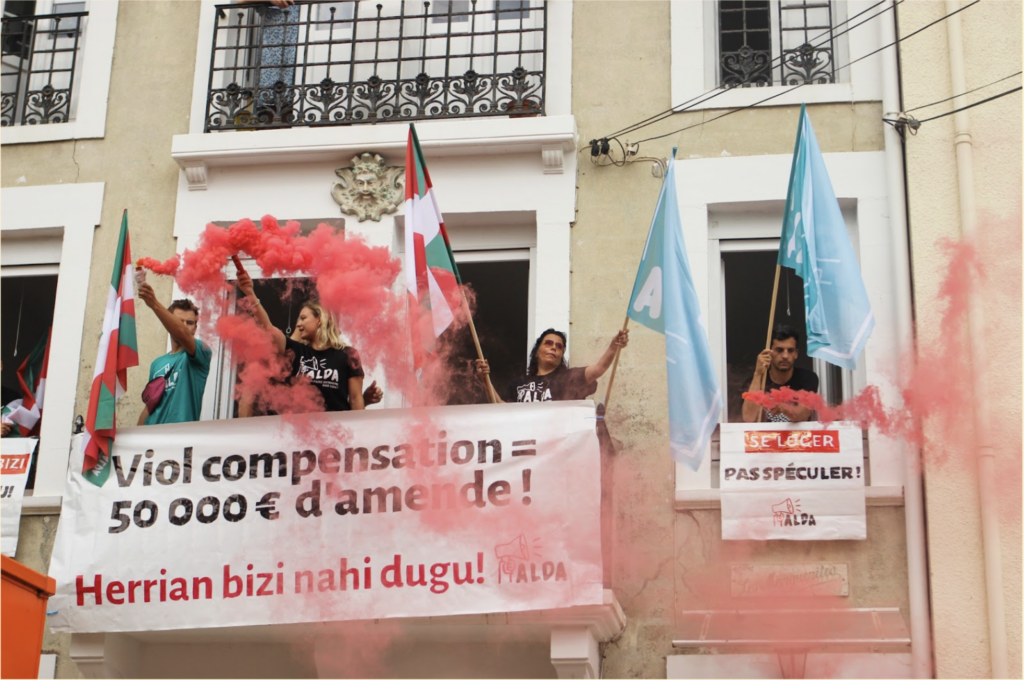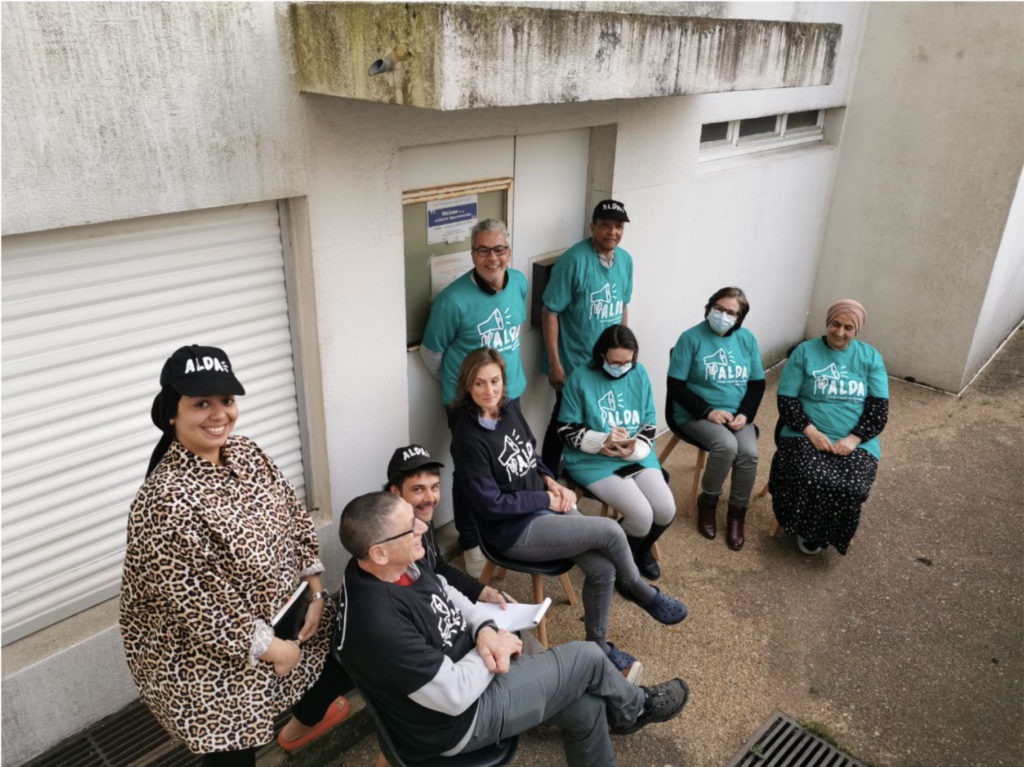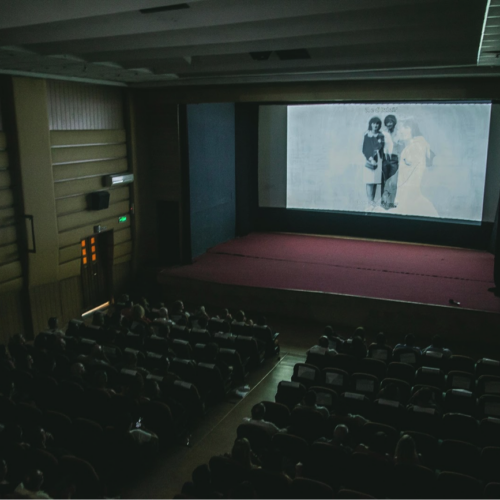We live in a time when the capitalist system encourages fragmentation and strong individualism. A time in which traditional organisations, such as trade unions or churches, are tending to disappear, or lose strength. Yet these organisations used to offer to the working-class mutual help, socialisation, training and human rights protection. This leads to resignation, defeatism, lack of faith in people’s power, rise of insecurity, extreme right, abstention…and many other wounds for the most oppressed.
Acknowledging this trend, and considering that as long as the ecological movement does not address the real problems faced by the working-class, the vast majority of the population won’t take part in the social and ecological transition of our territories, a group of alter-globalist and ecologist activists from the Basque Country decided to launch a new organisation called Alda.

Alda’s aim is to defend the interests and the aspirations of the local population, families, and people of working-class neighbourhoods in the Basque Country. Meaning “Change” in Basque, Alda was born in October 2020 in the French Basque Country, a territory of about 320 000 inhabitants. In 3 years, Alda championed structural victories concerning the housing problem in the Basque Country (for example with the compensation law), and after analysing that housing was the main problem faced by the working-class here. The Basque Country is a tourist attraction where many city dwellers build their secondary homes, a phenomenon that got severely aggravated during Covid with the development of Airbnb. Alda’s relentless fight made the development of new Airbnbs almost impossible which constituted huge social and ecological victories for the region. Social because we are gaining back housing on the housing market. Ecological because every house that does not become a secondary residence or an Airbnb means building less, so less soil artificialisation, less use of resources, and people living closer to their work and using less cars…
At the heart of Alda’s method is the desire for the working-class to gain back power and to aspire-while-building a strong working-class movement. Community-organising was central to Alda’s creation, our thinking drew from Saul Alinsky and post-Alinskysts’ work on community-organising, and the work done by l’”Alliance Citoyenne” in France. This translates in two ways in Alda’s practice. First, the role of neighbourhood collectives has been central to the organisation. Second, because we receive daily sollicitations, we define battles and create working groups and thematic collectives building on what emerges from the people who come to Alda and their concrete issues and needs. Last year, we received no less than 749 individuals and family support requests. After identifying common issues, we gather people who face the same problem to fight together for structural change on that matter. This is a type of “community-organising” that is not based on geography but rather on commonalities with the purpose of creating collective organisation and power to defend common interests toward the institutions, the State, or the landlords.
The work of community-organising in some neighbourhoods was meant to be launched in the very beginning of Alda’s creation. However, due to the many restrictions imposed by Covid, we weren’t able to go door-to-door and started an exploration phase with an outdoor survey, which enabled us to identify neighbourhoods where there were particular needs to launch a collective dynamic. That process led to the 3 constituted and currently active collectives launched between 2022 and early 2023: Alda Cam de Prats, Alda Habas, and Alda Lespes. Besides, Alda has accompanied 11 collective dynamics in neighbourhoods from 6 different cities since the launch of this work in February 2022. What’s interesting about working with collectives is that it starts with meeting all the inhabitants of a neighbourhood and asking the questions, “what goes wrong?”, but most importantly… “what should be improved?”, “how would you improve life in your neighbourhood?”. Here, inhabitants are raising the thinking around their future in the neighbourhood.

Alda kick-started the neighbourhood collectives using very classical tools of community organising, with an organiser supported by volunteers, getting into full door-to-door mode to gather more than half of the contacts of the neighbourhood. We then organised the first meeting with the inhabitants, defining and launching with them the first demands and the first battles that could be a win, to grow the aspiration for how collective organisation can achieve victories. Alda Cam de Prats won beautiful victories such as the installation of a playground; the opening of a collective premise for the inhabitants to gather; the installation of new benches for the elderly; the change of a road intersection that was dangerous…
Alda Habas, launched with the same method as the first collective, also conquered victories such as the reinstallation of a postal box, a premise for the collective, the organisation of a big neighbourhood party and garage sale in June 2023 counting with 300 people. The collective holds a major fight against a huge problem of house humidity, a problem that affects more than 100 accommodations in a neighbourhood of 500. Alda Habas has achieved important milestones on this end by advancing an independent study which concluded that there were structural issues in the buildings, and rallying for the intervention of the social landlord to do the works. The collective is now fighting to have engagements regarding the dates of intervention and for the works to start as soon as possible (in the first half of 2024).
The third collective started off in a different way, with a very active volunteer who, inspired by Alda Cam de Prats and Alda Habas, wanted to make his neighbourhood a better place, but who also faced the same moisture problem as Alda Habas. With Alda’s support, he decided to launch Alda Lespes in May 2023. He was from the beginning the leader of the project and therefore the community organiser. This is the way we want to keep developing collectives in Alda, as it enables people from the neighbourhood to be central in the organisation, to take responsibility, making collectives less dependent on the organiser. Currently, there is work done in two neighbourhoods at the moment that we think could lead to the launch of such collectives. Alda also develops tools to facilitate this development: training for collectives to develop their skills, such as trainings on “how to lead and facilitate a meeting”, “how to organise a non-violent direct action”; collective meetings and experience sharing by the collectives… We also develop links between the collectives to launch common battles that don’t only concern one neighbourhood but all the neighbourhoods from a social landlord (in France, public housing is done with social landlords building, owning and managing a housing stock, the two main social landlords in the Basque country own about 7000 housing each).
Although the collectives are not developing as fast as we thought, there are ingredients in Alda that make the collectives and the approach stronger. A strong organisation identity that ties people to the organisation, to a greater fight, drawing from but beyond neighbourhood issues. This eases the work of creating and transmitting a political collective culture. And there are big victories against Airbnb and fraudulent landlords which make people proud of being part of Alda.
On another front, a network of 130 volunteers distributes 3 times a year 40 000 exemplaires of a journal amid the working-class neighbourhoods’ straw mattress. This enables Alda to communicate directly with people, talk about their daily issues, what’s happening in their block, ask for testimonies…
To conclude, mobilisation in a time of individualism is complicated. It is not necessarily linked to the method of community organising, but to the anchoring of defeatism and individualism in the current society, which is precisely what we want to fight against and why the community-organising and collective work is at the same time so necessary and so hard. This is why a structure like Alda, obtaining concrete victories and doing field work connected to people and their daily issues is essential to take back power and reverse the current trend. Step by step and together, we gain strength, dignity and create the moulds for a new society.


